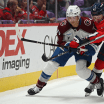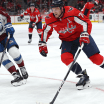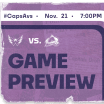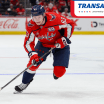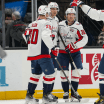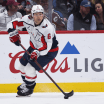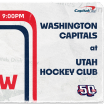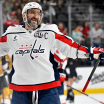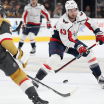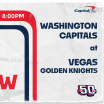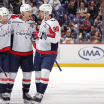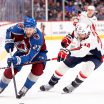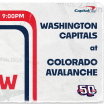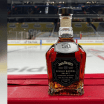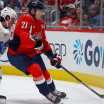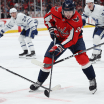It was nearly 43 years ago that the Washington Capitals first took to the ice for an NHL regular season game. That 6-3 loss to the New York Rangers at Madison Square Garden on October 9, 1974 was the culmination of years and months of legwork and preparation.
Caps History: Opening Night - Oct. 9, 1974
Washington was awarded its franchise in May of 1972.
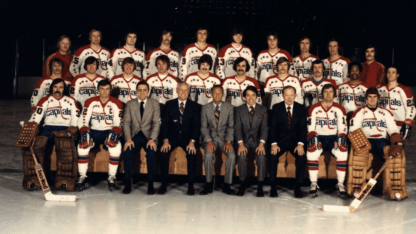
Washington was awarded its franchise in May of 1972. Milt Schmidt was hired as the team's first general manager in 1973 and by year's end he had assembled his assistant (Lefty McFadden), his head scout (Red Sullivan) and had spirited another respected scout (Billy Taylor) away from another NHL club (the Flyers). On May 31, 1974, Schmidt signed Jimmy Anderson to a two-year deal as the team's head coach.
In January of 1974, the team was christened Capitals aftera contest that produced several other "finalists" including "Domes," "Cyclones," "Streaks," and "Comets." The most popular choice was "Comets;" it garnered 250 votes. "Capitals" was the choice of 88 voters. One of those who chose Capitals was the recipient of a pair of season tickets. Runners-up received two pairs of season tickets (ba-dump-bump). Actually, the 87 runners-up received autographed hockey sticks.
Season tickets were sent out to an initial base of several thousand subscribers. Although 30,000 requested information on season tickets, the team's base fell far below the projected goal of 10,000 because the club insisted on demanding full payment for tickets when they went on sale. Checks were cashed but according to local news reports, it was months before those who sent money received their tickets or any information concerning their applications.
Television and radio deals were set up; all 80 games were broadcast on WTOP-AM but a mere 15 of Washington's 80 games were televised locally during the 1974-75 season.
In July, the Caps announced the hiring of a staff of 14 "minor officials," now known as "off-ice officials." Some of those gentlemen are still serving in that capacity and have done so for more than three decades now.
An expansion draft, an amateur draft and several other player transactions took place during the late spring and summer of 1974. When the Caps opened their maiden training camp in London, Ontario on Sept. 14 of that year, there were 56 players vying for jobs. One of those who didn't make the cut was a young Harvard graduate named Bob Goodenow. Goodenow later became the the head of the NHL Players' Association (1992-2005).
Doug Mohns, a 40-year-old defenseman who made his NHL debut in 1953-54 as Schmidt's teammate on the Boston Bruins, was obtained from the Atlanta Flames in June and named as the first Capitals captain. Only one (Tommy Williams, 34) of the other 53 players in camp that year was older than 28. Mohns turned 41 in December of that first season.
Finally the team's schedule, seating capacity and pricing structure were announced. Washington was placed in the Norris Division along with Detroit, Los Angeles, Montreal and Pittsburgh. The Capital Centre initially seated 17,962 patrons for hockey and ticket prices were $8.50, $6.50 and $4. Season ticket packages could be had for $340, $260 and $160. During the 1974-75 season, the Toronto Maple Leafs had the league's highest ticket prices at $12.
Of course, the team had expenses long before the puck dropped in New York on October 9. Washington's five-day rookie camp set the team back $16,100. Training camp cost the club an additional $55,000 in meal money, travel and hotel expenses and salaries for Schmidt, Anderson and the rest of the staff.
As Opening Night drew nearer, The Washington Post ran an extensive, multi-part series on hockey basics designed to educate the novice fan. The Post piece featured Peanuts comic strip canine Snoopy as the hockey-playing example. The Washington Star-News ran a Mohns-authored piece on how to watch a hockey game.
Finally, the calendar pages turned to October 9 and all the paper shuffling, marketing and check-writing took a back seat to the game itself. With Ron Low - he of the 1.82 preseason goals against average - manning the pipes for Washington, the white-panted Caps faced the Rangers, an Original Six team coming off a 102-point season and just 18 months removed from its most recent appearance in the Stanley Cup finals.
The nascent Capitals held their own for most of the game's 60 minutes. Rookie center Jim Hrycuik gave Washington its first-ever lead at 5:06 of the first period. Skating on his first NHL shift, Hrycuik stripped the puck from veteran defenseman Rod Seiling and skated into the New York zone with linemate Dave Kryskow on his wing. When the lone man back for the Rangers (defenseman Gilles Marotte) opted to cover Kryskow, Hrycuik went to the net and slipped his first NHL shot -a backhander - netward. It beat future Hall of Famer Eddie Giacomin and the Caps were on the board.
"The defenseman just stood there and the goalie - I'm not sure of his name - stood up so I didn't have any trouble," said Hrycuik afterwards.
The Rangers answered less than a minute later on a goal by Greg Polis, who would later do time with the Capitals. Polis scored again in the third period, snapping a 3-3 tie with what proved to be the game-winner. Rick Middleton - skating in his first NHL game - also scored twice for New York.
Ron Anderson scored Washington's first-ever power play goal, a tally that gave him a great sense of personal relief.
"I'm kind of relieved," sighed Anderson after the game. "Last year I went 20 games in the American League before my first goal."
After Middleton scored to give New York a 3-2 lead early inthe third, the Caps answered and tied the game on a Kryskow goal. But Kryskow's marker came on what would prove to be Washington's only shot on goal in the third period. The Rangers outshot Washington 19-1 in the third and 43-12 on the night, cruising to a 6-3 win in the process. "It could have been worse, but not much," said Low, who then had no idea of the shell-shocking that awaited him over the season's next 79 games. "It's not going to be like it was tonight all year. The first two periods the guys played pretty good hockey. But we were pretty tired after that trying to keep up with the Rangers.
"The defense just fell down, that's all. But you've got to expect that - we're brand new. Still, I think we've got a pretty good team. It's just that we played a better one."
Those comments were echoed by most of Low's teammates and head coach Anderson, too.
"They always talk about how expansion dilutes the quality of play," observed coach Anderson after the game. "But these kids really looked like they belonged out there. I think we're going to give some teams a lot of trouble.
"They were tired. Remember, they were playing a pretty good hockey club. They played against a club that should have won the Stanley Cup four years in a row."
Ron Anderson also saw a good future for the expansion Caps after their first night on the ice.
"We should be all right now," he said. "What else have we got to be nervous about? We played a tough team in their own rink. I'm tired. We're all tired. But we know that we can play in this league."
Rangers bench boss Emile "The Cat" Francis also gave Washington its props in the aftermath of that first game.
"They worked, Washington; they really worked," said the diminutive Rangers coach. "In the third period we just kept the pressure on them, won the faceoffs and kept them in their end. They worked really hard in the first two periods and it took its toll. But you've got to give them their marks, they've got a good little team."
Francis, a member of the Hockey Hall of Fame, played for the old Washington Lions of the Eastern Hockey League as an 18-year-old goaltender during the 1943-44 season.
"It was hard to imagine Washington being in the National Hockey League," he remarked. "It was scary that Washington had this team for only a few weeks and here they were skating with the Rangers like that.
Ironically, Giacomin also had a taste of pro hockey with the Lions in 1956-57.
"It took me two hours to find Uline Arena the first time," said Giacomin, remembering his days in DC. "I hear we play in a new place now."
But amid all the plaudits for the plucky Capitals, there were a few ominous observations, too.
"The worst moments were when we got trapped in our own zone and couldn't move the puck out," admitted Hrycuik after the game. "They swarmed all over us. They hit us. They out-muscled us. I never realized how strong some of the guys are who are in this league."
And the beleaguered Ronnie Low was only just then beginning to sense what a rough ride he would be in for as the primary goaltender on what would go on to become the worst team in NHL history.
"I have no feeling left in me," he said, exhausted. "I'm numb. I've been numb for 30 minutes or so. I can't say I'm proud. We lost, didn't we? But what the hell, we ran out of shots."
Low would have many, many more nights like this one as Washington managed a sorry 8-67-5 record in its first season. But better and brighter days were on the distant hockey horizon in the District.

